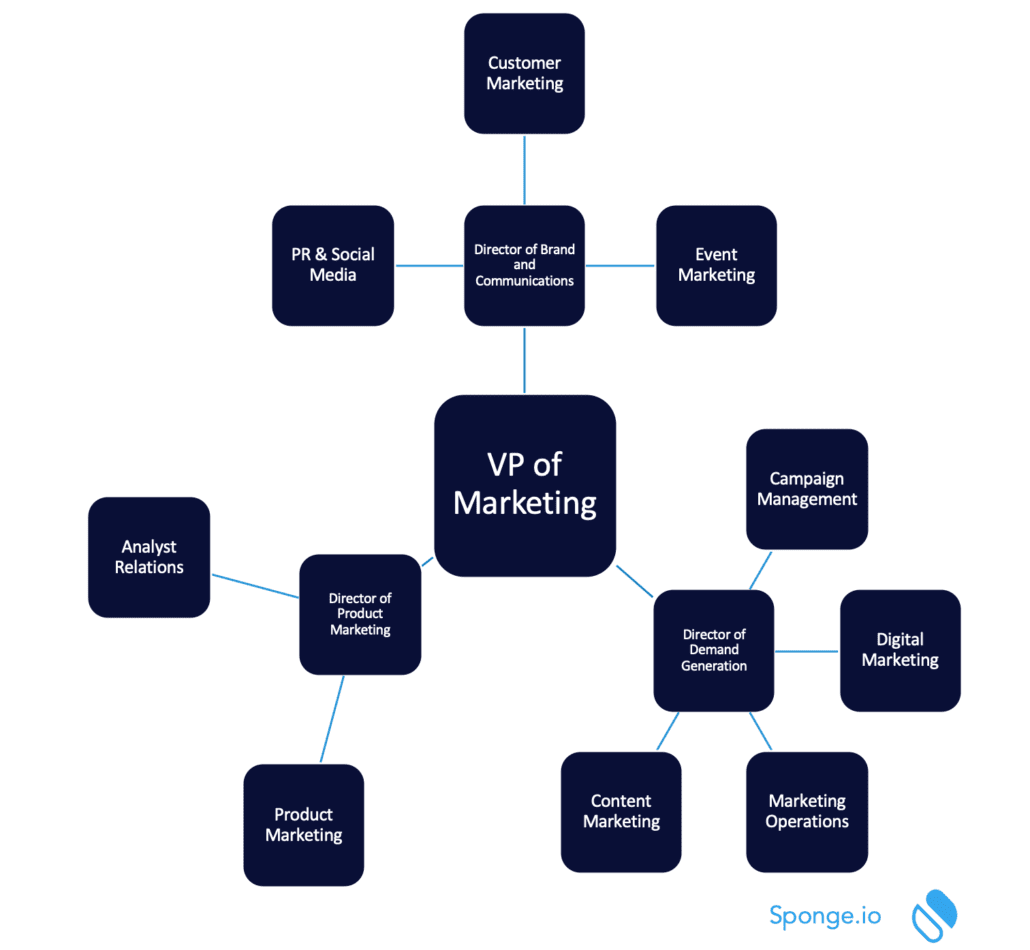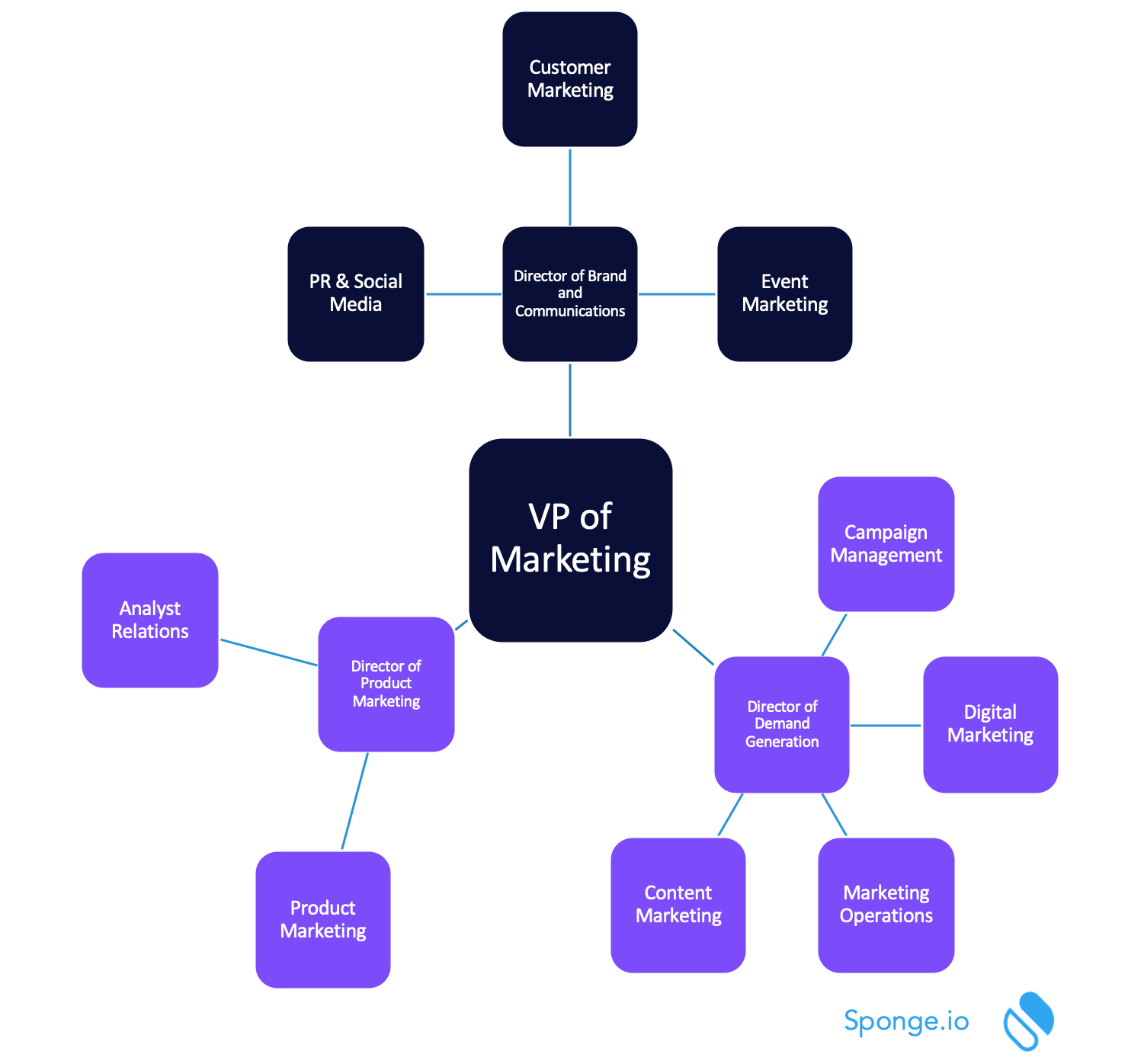Marketing job descriptions have changed dramatically in the last decade, and the mix of people you need on your marketing team is very different than it was in the past. There are new roles and skill sets, new technologies, new mindsets and biases. In this post, I’ll share a team structure that has worked for me in the past, including roles, org chart, and lessons learned on what not to do. Of course, this certainly isn’t the only way to structure your marketing team, but I hope it will provide visibility into the capabilities you need, regardless of how they’re organized.
>> Related: Marketing’s Shift from Brand to Revenue <<
In this post:
Sample B2B Marketing Org Chart
Here’s the org chart I’d use if I were writing new marketing job descriptions from scratch.


I’ve organized the team into three groups: 1) brand, 2) demand generation, and 3) product marketing. Each group is led by a Director, and the whole team is led by the CMO or VP of Marketing. This marketing team is comprised of the following 13 roles:
- VP of Marketing
- Director of Brand & Communications
- PR & Social Media Manager
- Customer Marketing Manager
- Marketing Events Manager
- Director of Demand Generation
- Marketing Campaigns Manager
- Digital Marketing Manager
- Marketing Operations Manager
- Content Marketing Manager
- Director of Product Marketing
- Product Marketing Manager
- Analyst Relations Manager
B2B Marketing Job Descriptions
This is our final post on the perfect marketing team, and we will be wrapping up be discussing the demand gen team, as well as the product marketing team. These teams are important because they are the ones responsible for getting customers in the door, and then getting them the right products. We will break down each position starting with the Campaign Manager on the demand gen team.
Marketing Campaigns Manager
Marketing campaigns are a great way to communicate with team members, clients, and leads. In today’s tech thriving world campaigns can be used to not only generate sales leads, but also to help progress those leads through the sales funnel. This is easier said than done however, as too much contact with leads can cause them to unsubscribe, and too little contact can cause them to feel unwanted and leave the sales funnel all together.
Responsible for:
- Building and growing company database of sales leads including name, company, title, contact information.
- Automating marketing campaigns process to engage with and nurture leads as they progress through the sales funnel.
- Managing and designing email, blog, webinar, and other campaigns that will be collaborated with other in-house marketing team members.
- Measuring and reporting on key metrics from campaigns such as open rate, conversion rate, and MQL.
Digital Marketing Manager
Once your company has enough size it is time to switch your marketing approach from purely outbound, to a more inbound marketing strategy. This will require hiring a full time position, hence the Digital Marketing Manager.
Responsible for:
- Generating engaging content and posting frequently
- Building demand through content enhancing company prospective leads list
- Automating marketing strategies to ensure productivity of channels including social, email, blog, etc.
- Optimizing conversion rates through CTA’s and landing pages.
Marketing Operations Manager
Marketing operations managers are the Swiss Army knife of the marketing team. They are able to do a little bit of everything and go back and forth between the creative and analytical sides. The main overall goal to get out of a marketing operations manger is to measure all of the ROI from marketing activities. Another important goal for a Marketing Ops Manager is to be the liaison between the marketing and sales team to ensure a cohesive marketing message throughout the sales process for customers.
Responsible for:
- Managing company CRM systems used by the marketing and sales teams (Salesforce, Marketo).
- Establishing and maintaining line of connection between key marketing team members and sales team members.
- Creating and maintaining metrics reports on marketing and sales activities, effectiveness, and business impact.
- Analyzing marketing and sales data to develop insights and make recommendations on areas for optimization.
- Monitoring and maintain data quality within the marketing database.
Content Marketing Manager
You may have noticed in the first two marketing job descriptions that generating content is mentioned often, and that is because content is the fuel that drives your marketing campaigns. According to the Content Marketing Institute, B2B businesses that allocate 42% of their annual budget have higher ROI from marketing campaigns than those who send an average of 28% of their annual budget on content marketing. You have to have someone whose job it is to create the best content for your marketing campaign; you have to have a Content Marketing Manager:
Responsible for:
- Creating marketing resources each month to drive metrics such as leads, subscribers, and brand awareness.
- Consistently blogging to attract site visitors through search, social media, and email subscribers.
- Increasing subscriber base by releasing regular, and helpful content that’s aligns with their needs and interests.
- Collaborating with internal marketing team, and external influencers and industry experts to produce content that meets the needs of both key stakeholders and our audience.
Product Marketing Manager
The Product Marketing Manager is a very important role. They have to be able to work with both the marketing and the sales team to ensure a fluid message is being relayed to the customer. One of the main activities for the Product Marketing Manger is to determine the value proposition for a product, and how it can be incorporated into the marketing message. Possibly the largest task though, is understanding the companies customers. The Product Marketing Manager is responsible for developing a buyers persona for the company.
Responsible for:
- Develop product positioning and messaging that differentiates company products in the market.
- Develop and communicate the value proposition of products to the sales team to ensure marketing message.
- Plan the launch of new products and releases while managing cross-functional implementation of the plan.
- Understand customer personas and their needs through research, direct observation, and conversations.
Analyst Relations Manager
The Analyst Relations Manager is responsible for facilitating regular contact with the analyst community, driving strategic analyst relations programs, collaborating with sales, marketing, product management and company executives to engage with analysts on new product enhancements, company news and strategic initiatives.
- Work with product marketing to secure positive analysts reports, and deliver quality information to analysts
- Work with analyst firms to complete research reports and whitepapers
- Preparing analyst briefing tours, presentations, and documents
- Oversee budget, analysis and recommendations for purchased analyst research services
- Support the communications team in other PR-related programs and activities
There is not “one-size fits all” for the perfect marketing team; there are too many variables like company size, structure, etc. Having said this, we here at Sponge believe this a highly effective marketing team and most companies can benefit from its structure. Of course you need to find the right people to fill these positions, but if you can, then you are well on your way to building the perfect marketing team.
This is the final post in the Building the Perfect Marketing Team series:
Real talk: hope is not a strategy! This robust Lead Gen Plan template maps how many leads and opps you need to generate each quarter.




